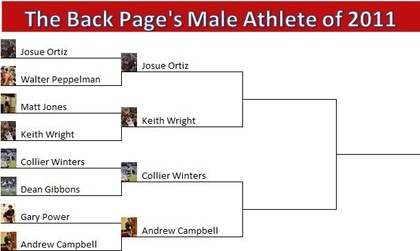2011 was a big year in Harvard athletics. Women’s soccer captured its third Ivy League championship in four years. The men’s basketball team took home a share of the Ancient Eight title and entered the nation’s Top 25, both firsts in program history. Football set a modern-era program record for points in a season, scoring 374 points en route to a 9-1 finish and a league crown. Four other teams—men’s fencing, men’s heavyweight and lightweight crew, and softball—also finished 2011 on top of the Ivy League standings.
There were a number of standout individual performances as well. Women’s fencer Alexandra Kiefer captured the NCAA Foil Individual title. Men’s basketball forward Keith Wright became just the second player in Harvard history to take home Ivy League Player of the Year honors. Women’s soccer and lacrosse captain Melanie Baskind was named to the First Team All-Ivy in two different sports and was selected as the Ivy League Player of the Year in soccer.
We at The Back Page have taken on the tall task of determining the best Harvard athlete of 2011. Here’s how it will go down: we’ve selected 16 standout Harvard athletes—eight male and eight female—and set up two single elimination brackets. Each round, Harvard’s finest will square off in head-to-head matchups. And based on their performances in 2011, we will determine who advances and who is eliminated until just one male and one female remain. Then, the two champs will square off to determine the top Harvard athlete of 2011.
Last week, we went through each of the individual matchups. Now, it’s time to reveal the winners. Yesterday we revealed the first-round winners from the first half of the men's bracket. Today we reveal the other half.
Check back all this week as we go through our selections.
Collier Winters v. Dean Gibbons
In his final season with the Harvard lacrosse team, Dean Gibbons made his mark on the Crimson record book, breaking into Harvard’s all-time top 10 in points and earning a unanimous first-team All-Ivy nod. But fellow senior Collier Winters went one step further, coming back from injury—and QB controversy—to become the third ever passer to throw for at least 400 yards as well as the third to connect on five touchdown passes in a single game.
And there’s something to be said about leading a team to a perfect record in Ivy League play—the highest achievement possible for a football team ineligible for postseason action. After a loss to Holy Cross in the first game of the season, Harvard was untouchable, winning nine straight matchups by at least 10 points to close out the year. Winters finished his 2011 campaign with an impressive victory in the oldest college football rivalry in the nation, The Game, while the lacrosse team just missed out on an Ancient Eight title with a 15-6 loss to Cornell in the championship.
WINNER: Collier Winters
Although both Gary Power and Andrew Campbell fared well on the national stage in 2011, Campbell was much more dominant. While Power earned a No. 7 national ranking on the squash court, Campbell was honored as the 2011 US Rowing Man of the Year. The sophomore rower earned victories at Elite Nationals and the U23 World Championship Trials. And the matchups weren’t even close. Add a sprinkling of international achievements to all of that, and Campbell has a clear edge over his competitor from the squash team.
Power entered his first season of college squash with big shoes to fill after the graduation of Colin West ’10—the 2010 CSA Individual Champion. And the then-rookie was able to help a young Harvard team maintain its status as the fifth-best team in the nation. But Campbell’s bronze medal in the lightweight single at World Championships as well as other international accolades set him apart.
This season, the Harvard squash team looks to contend for the national championship for the first time in at least a decade, with Power currently holding the No. 3 spot on the team. Campbell is currently one of the top five lightweight rowers in the world.
WINNER: Andrew Campbell




